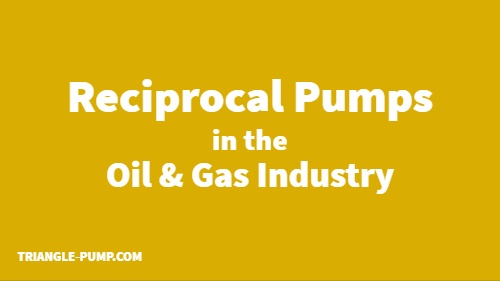Reciprocating pumps are used to transport both clean and abrasive fluids. These pumps are more efficient and robust than their centrifugal or rotary counterparts, making reciprocating pumps the ideal choice for the oil and gas industry.
How Reciprocal Plunger Pumps Work
A typical reciprocating pump setup consists of a motor and the pump itself. The shaft of the motor is connected to the crankshaft of the reciprocating pump via a sheave and v-belt.
When the motor is energized, the shaft of the motor rotates resulting in a proportional rotation of the reciprocating pump’s crankshaft; thus transferring energy from the motor to the pump.
Inside the pump are several plungers, usually two or more, which are connected to the crankshaft via extension rods.
Each plunger moves in and out of a hermetically sealed fluid chamber once during each full rotation of the crankshaft.

Movement of the plungers change the volume of the fluid by alternating vacuum and pressure inside the fluid chamber. This phenomenon is known as positive displacement.
As the plunger exits the fluid chamber, the resulting vacuum causes fluid to enter the chamber from the intake through the suction valve. As the plunger moves into the fluid chamber, it creates pressure that causes the fluid to be expelled from the chamber through the discharge valve. Most reciprocating pumps contain several fluid chambers which operate independently of one another. As one chamber expels fluid, another chamber fills.
This allows movement of fluid through the pump at a constant and uninterrupted volume. For this reason, reciprocating pumps are also known as constant volume pumps.
How Reciprocal Pumps Are Used in the Oil and Gas Industry
During processes such as distillation, reciprocating pumps are used to move fluids through the process or from one area of a facility to another. Because of the typically corrosive nature of the fluids, it is imperative that the pumps used are reliably durable. Reciprocating pumps are ideal for oil and gas applications requiring high reliability, high output, or any other high-pressure, low-volume application.
Learn More
To learn more about the different reciprocating pump components and which is best for your application, reach out to the experts at Triangle Pump Components today.